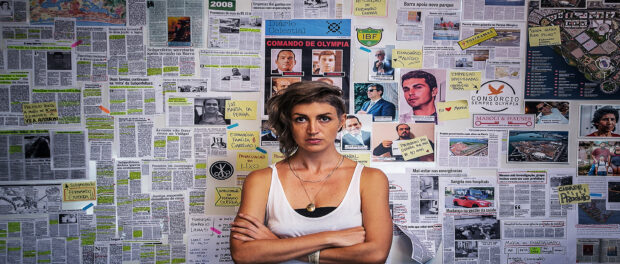
Olympia is a jarring new documentary-fiction film that explores the nature of corruption in the lead up to the 2016 Olympic Games. Inspired by the work of investigative journalist Lucio Vaz and real events in Brazil’s history, writer and director Rodrigo Mac Niven cleverly juxtaposes fictional and non-fictional worlds. The film, which was successfully crowdfunded and completed in just six months, is set for release on September 15. Part legend, part documentary, part political thriller, Olympia rings hauntingly familiar in post-Olympic Rio de Janeiro.
The film takes place in the city of Olympia, a fictionalized Rio de Janeiro with its own elaborate graphic novel backstory entitled Olympia: A Historia Perdida (Olympia: The Lost History). The story, while mythological, is a familiar narrative of political oppression. A people once free, represented in the story as winged voadores (flyers), are persecuted, their wings forcibly clipped by the land-driven and land-bound pés-no-chão (feet-on-the-ground). A pivotal moment of the story is when the pés-no-chão behead a voador named Demokracia in the name of maintaining order. The symbolic act becomes a motif in the film.
The film itself opens in 19th century Barra da Bananal, a reference to Barra da Tijuca. We see a woman desperately running from a masked horseman, a standoff that is supposed to be a reference to the farmers and fisherman who had their land stolen by the wealthy dons of Barra da Tijuca. The area today, one of the Olympic centers, is a site of continuing land disputes and a focal point of the film.
We are then transported to modern day Olympia, a dystopian Rio de Janeiro where a decapitated Demokracia stands conspicuously in the place of Christ the Redeemer. Here, Mac Niven is introduced to real-life lawyer and environmental activist Jean Carlos Novaes. In the scene, which is a recreation of the conversation that started the Olympia film project, Novaes tells Mac Niven that the controversial Olympic Golf course is built on an environmental reserve. A law was passed revoking the protected status of the land and allowing the construction to move forward. This legal action, which was actually reversed last month, is a prime example of corrupt government practices in Brazil. Inspired, Mac Niven enlists the help of his journalist friend Lia, played by Patricia Abelson, and the team of three sets out to make a film.
The audience is drawn into the meta investigative process as the scandals of the film are all thinly disguised references to actual people and events in Rio. The film, while grounded in reality, always provocatively edges towards the fantastical. As the characters delve deeper into the investigation, their wings emblematically emerge again.
Intense scenes in Olympia are cut with traditional documentary style sit-down interviews with a wide range of experts and political figures including attendees of the the 2012 International Anti-corruption Congress in Brasília. Other speakers include Colombian philosopher Bernardo Toro and Brazilian poet Sérgio Vaz, who poignantly recites his poem “Os Miseráveis” (The Miserables).
Notably, the film features an entire portion dedicated to documenting the stories of residents of Vila Autódromo and their astounding history of resistance against Olympic evictions. Each featured resident sits on a single chair, perched precariously among the ruins of their demolished community. Overhead drone camera shots and combined with real audio footage from the June 3 attempted demolitions in Vila Autodromo make this story feel, appropriately, like something from a horror movie.
The film’s tag line, “the city where not everyone has a price,” comes directly from the mouth of Vila Autódromo’s well-loved leader, Maria da Penha. Her slogan, which came to represent the community’s struggle, was often spray-painted on the walls of the community. But, while not everyone has a price, it becomes clear through the film that the 2016 Olympics does: US$20 billion, according to estimates from featured economist Andrew Zimbalist, not to mention the huge environmental and social costs of the Games. After hearing testimonials from experts such as Chris Dempsey, co-chair of No Boston Olympics, it begins to seem like being named an Olympic host city is more of a curse than a prize.
The film closes with a televised speech from Pablo Passos, played by Cláudio Mendes, the fictionalized Municipal Secretary and mayoral candidate for Olympia. Mendes, in what is perhaps the best performance of the film, delivers a monologue brimming with self-righteous condescension. “Equality? Human rights?!” he mocks.
Stranger than fiction, and definitely stranger than documentary, Olympia is a film that leaves one unsettled. The film delivers an urgent whisper in the ear of its audience to wake up and find the courage needed to develop a new political ethics. The film itself, featuring real-life warriors for democracy and justice and 534 fictional voadores, stands as a compelling example of the power of collective bravery.
Olympia is on release in Brazilian cinemas from September 15. For more information see the film’s Facebook page.




